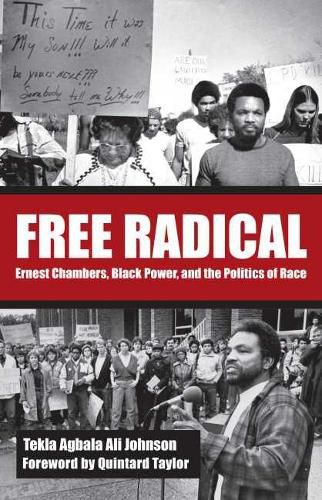Readings Newsletter
Become a Readings Member to make your shopping experience even easier.
Sign in or sign up for free!
You’re not far away from qualifying for FREE standard shipping within Australia
You’ve qualified for FREE standard shipping within Australia
The cart is loading…






Amid the deadly racial violence of the 1960s, an unassuming student from a fundamentalist Christian home in Omaha emerged as a leader and nationally recognized black activist. Ernest Chambers, elected to the Nebraska State Legislature in 1970, eventually became one of the most powerful legislators the state has ever known. Omaha native Tekla Agbala Ali Johnson illuminates his embattled career as a fiercely independent defender of the downtrodden.
Tracing the growth of the Black Power Movement in Nebraska and throughout the US, Johnson discovers its unprecedented emphasis on electoral politics. For the first time since Reconstruction, voters catapulted hundreds of African American community leaders into state and national political arenas. Special-interest groups and political machines would curb the success of aspiring African American politicians, just as urban renewal would erode their geographical and political bases, compelling the majority to join the Democratic or Republican parties. Chambers was one of few not to capitulate. In her revealing study of this man and those he represented, Johnson portrays one intellectual’s struggle alongside other African Americans to actualize their latent political power
$9.00 standard shipping within Australia
FREE standard shipping within Australia for orders over $100.00
Express & International shipping calculated at checkout
Amid the deadly racial violence of the 1960s, an unassuming student from a fundamentalist Christian home in Omaha emerged as a leader and nationally recognized black activist. Ernest Chambers, elected to the Nebraska State Legislature in 1970, eventually became one of the most powerful legislators the state has ever known. Omaha native Tekla Agbala Ali Johnson illuminates his embattled career as a fiercely independent defender of the downtrodden.
Tracing the growth of the Black Power Movement in Nebraska and throughout the US, Johnson discovers its unprecedented emphasis on electoral politics. For the first time since Reconstruction, voters catapulted hundreds of African American community leaders into state and national political arenas. Special-interest groups and political machines would curb the success of aspiring African American politicians, just as urban renewal would erode their geographical and political bases, compelling the majority to join the Democratic or Republican parties. Chambers was one of few not to capitulate. In her revealing study of this man and those he represented, Johnson portrays one intellectual’s struggle alongside other African Americans to actualize their latent political power